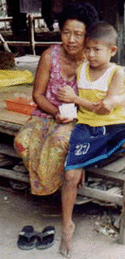The project also provides school funds for the children and runs programs such as the Thursday Club, a weekly opportunity for the grandmothers to come together for lunch, health education sessions, support, and medical services at the Chiang Mai Red Cross. The project also makes home visits to supervise and monitor patients and their caretakers, offers meditation sessions, provides respite care, and brings in extra help if someone is in the final stages of their illness. Last year Grandma Cares initiated "Train the Trainer" workshops in order to make their services more widely available, and with support from the Red Cross, held workshops to educate the wives of provincial officers so that they could join in local efforts to alleviate the crisis and reduce the stigmatization that comes with AIDS in Thailand.
"You must take a holistic approach to people and focus on health, not disease," the energetic Auntie Boon says. We think of the whole person and the family. AIDS must be understood as a psycho-social as well as a biological issue. We use many strategies, including education, community participation, love, respect, cooperation and spiritual training." This approach was recognized in 2001 when Grandma Cares was awarded 4th prize among 100 projects submitted by 120 Zonta International Clubs at its 14th annual district 17 conference in Bangkok.
Hope Watcharaprecha, an American, long time resident of Chiang Mai and current president of the city’s Zonta International chapter, remembers learning about the AIDS crisis in Thailand: "It was the 1980s and AIDS was spreading here. My husband’s best employee died of it and his wife was infected. The Red Cross, where I volunteered, was trying to raise awareness all over Thailand. We approached the Rotary Club and asked them to work with us. But people were so afraid of AIDS, they didn’t want to hear it. We had to sneak out to do our work. I had two young sons and I was worried. I wanted to educate young people. So we began having monthly lunch meetings for people with HIV/AIDS." Those lunches led to today’s growing Grandma Cares program, officially launched in 1997, which has now garnered international support and attention as its waiting list grows. In December this year it will hold its first Grandma Cares convention with support from six partner organizations, including Rotary clubs, in the Southeast Asia region.

According to the Thai Ministry of Public Health, mortality due to AIDS could soon become the leading cause of death in the country. Two-thirds of Thailand’s nearly one million infected live in the northern part of the country where Grandma Cares operates. Although rates of infection have traditionally been highest among commercial sex workers, those demographics are changing. Women, often married, middle-class and well-educated, are among those being infected in alarming numbers because their husbands and partners have sex with prostitutes. HIV prevalence in the north among pregnant women is between 4 and 8 percent. Based on those numbers, there will be an estimated 120,000 AIDS orphans, and more than 60,000 cases of infants with AIDS in the near future. Teens are also increasingly at risk in the north.
Dr. Anucmart Matanasarawoot, a family practice physician and researcher who works with Auntie Boon, explains. "Northern Thai girls are the most beautiful in the country. They are also raised in the Buddhist religion, and are required to show gratitude to their parents. When they are very poor they want to work to repay their parents. The agents who lure them are clever. They make promises but set them to work as prostitutes. Once they see how their parents are thriving, it is hard for them to stop. Materialism takes over. In the past it was easier, but today, the families have a house, a T.V. and more. The agents know this and they play on it."
Physicians and AIDS educators are worried about the situation in Northern Thailand. An estimated 80,000 youth are currently affected according to official figures but the real number is considered to be much higher. Surveys reveal that in the past only about 25 to 30 percent of young adults were using condoms, but that number has dropped alarmingly to just nine percent. Attempts by sex educators to have condom vending machines installed in educational institutions and other appropriate venues have been resisted because of fears they would promote sexual activity among teens. "In general," according to Grandma Cares leaders, "AIDS has been passed over by the Thai government. It’s still in denial, despite research findings." The King has allegedly told the prime minister to act on the problem in all 37 provinces in the country, paying particular attention to the hill tribes in the north.
Meanwhile, people continue trying to help in the trenches. Suthasinee Noiin is one of them. In her late 40s and living with cancer, she has set up Home Hug, or "Centre of Love" in the Isan dialect. It is a refuge for AIDS orphans who have been shunned because they have HIV or full-blown AIDS. Suthasinee, a social worker recently profiled by the Bangkok Post, sold her home to found the center where she takes care of 60 orphans, six AIDS patients, and seven drug-addicted youngsters. Elsewhere, a Thai physician is working with the Thai Red Cross Society’s AIDS Research Center to set up a "sperm washing" clinic to help husbands with the disease whose wives are not infected have children. The project is controversial and will be reviewed in public hearings.
"I’m optimistic about the future in Northern Thailand," Auntie Boon says. "Safe sex programs are being introduced successfully into brothels. Through public and private education we can make a difference." In the meantime, Grandma Cares, which has trained more than 1300 grandmothers and has a "dream team" of 1000 volunteers, has a waiting list of nearly 3000.
Elayne Clift, a writer from Saxtons River, Vt., is spending a year teaching and writing in Chiang Mai, Thailand.
